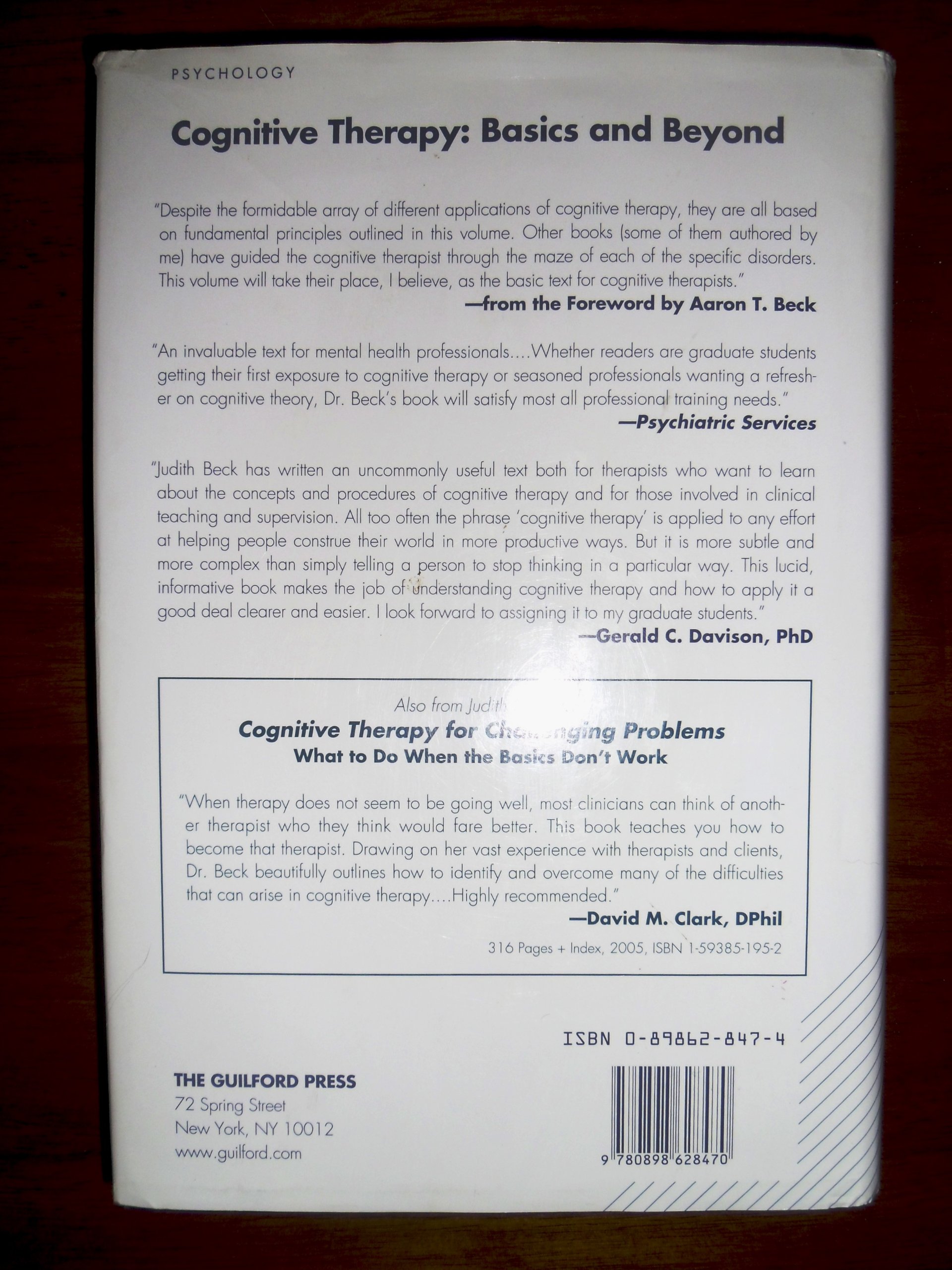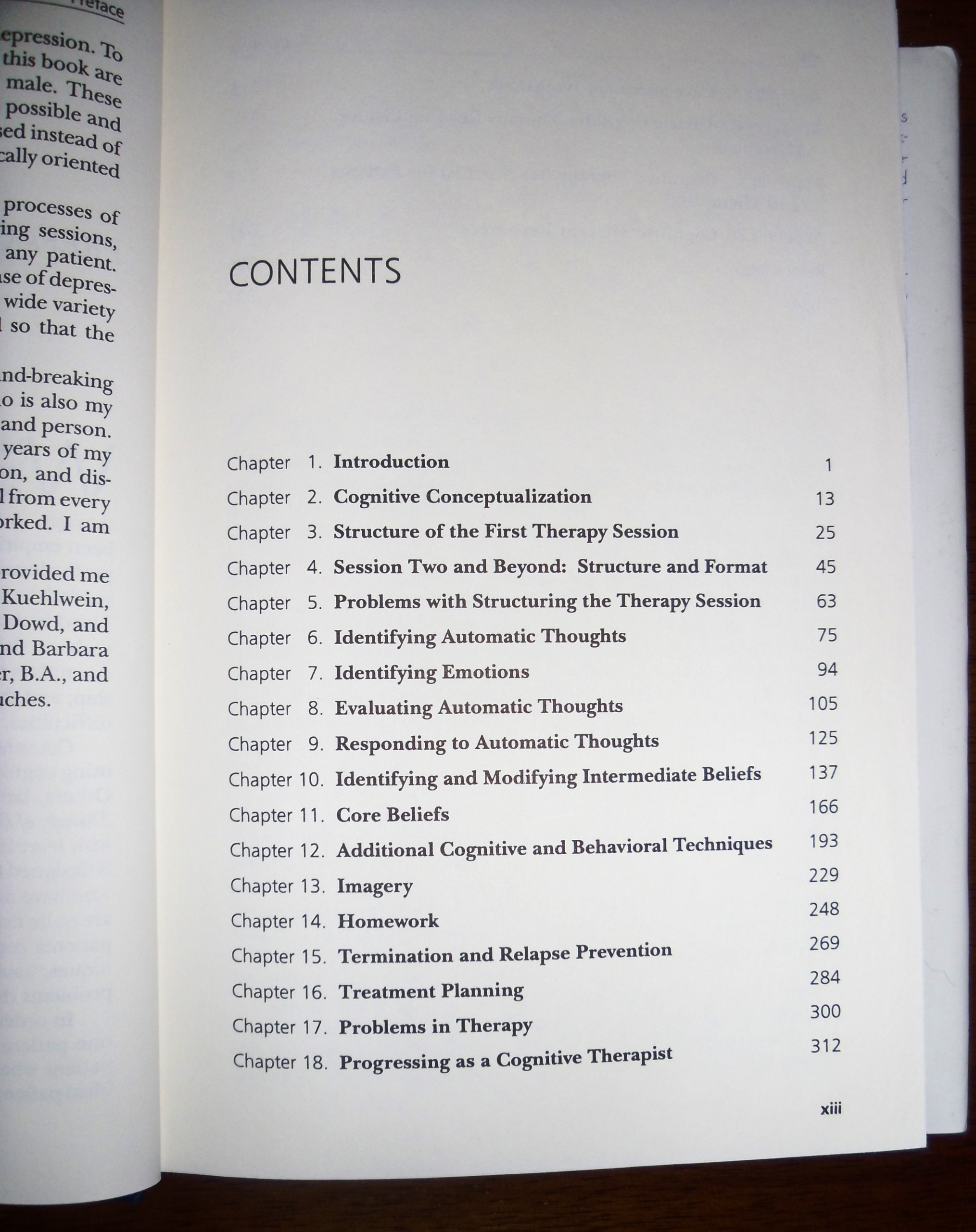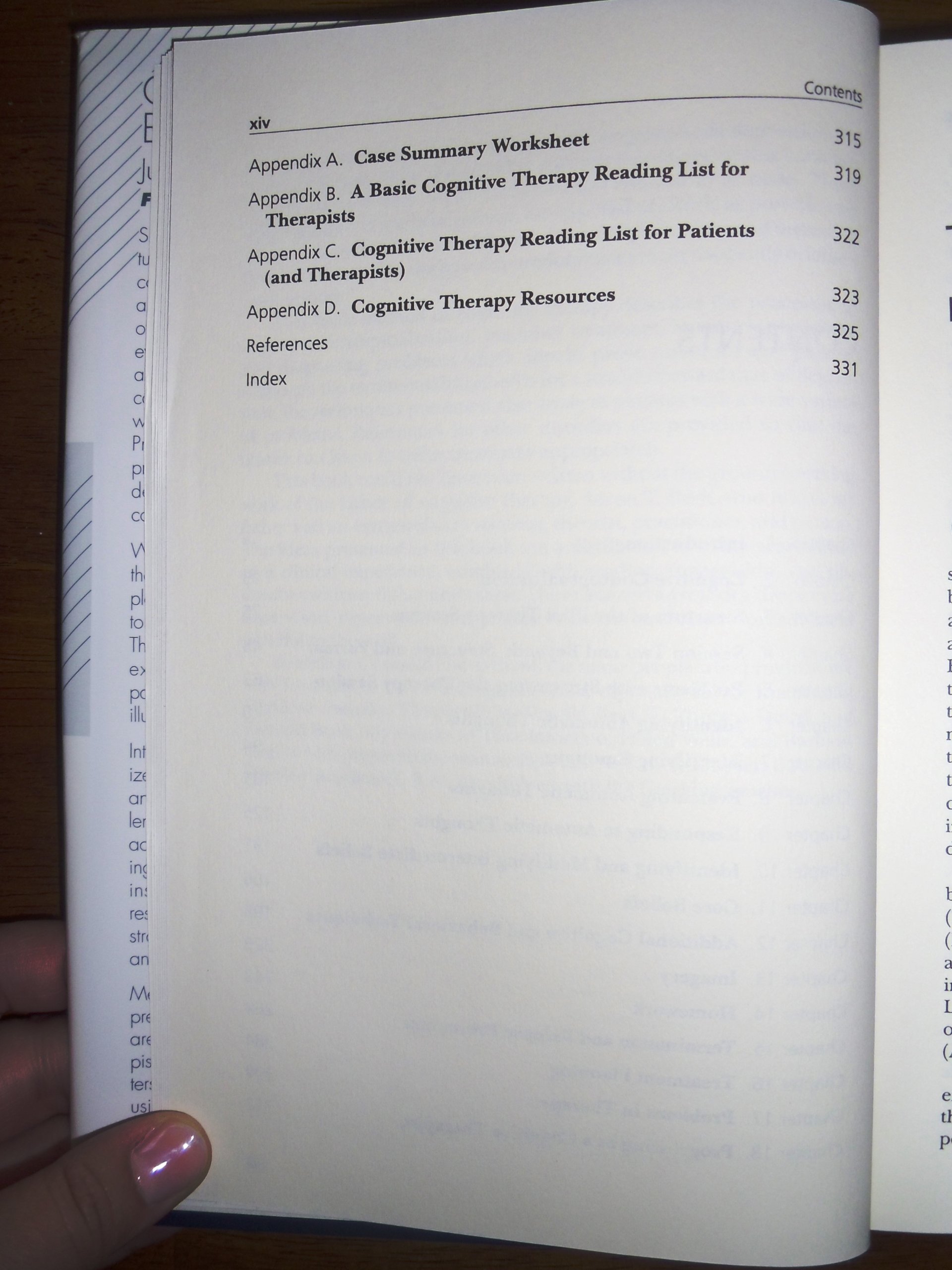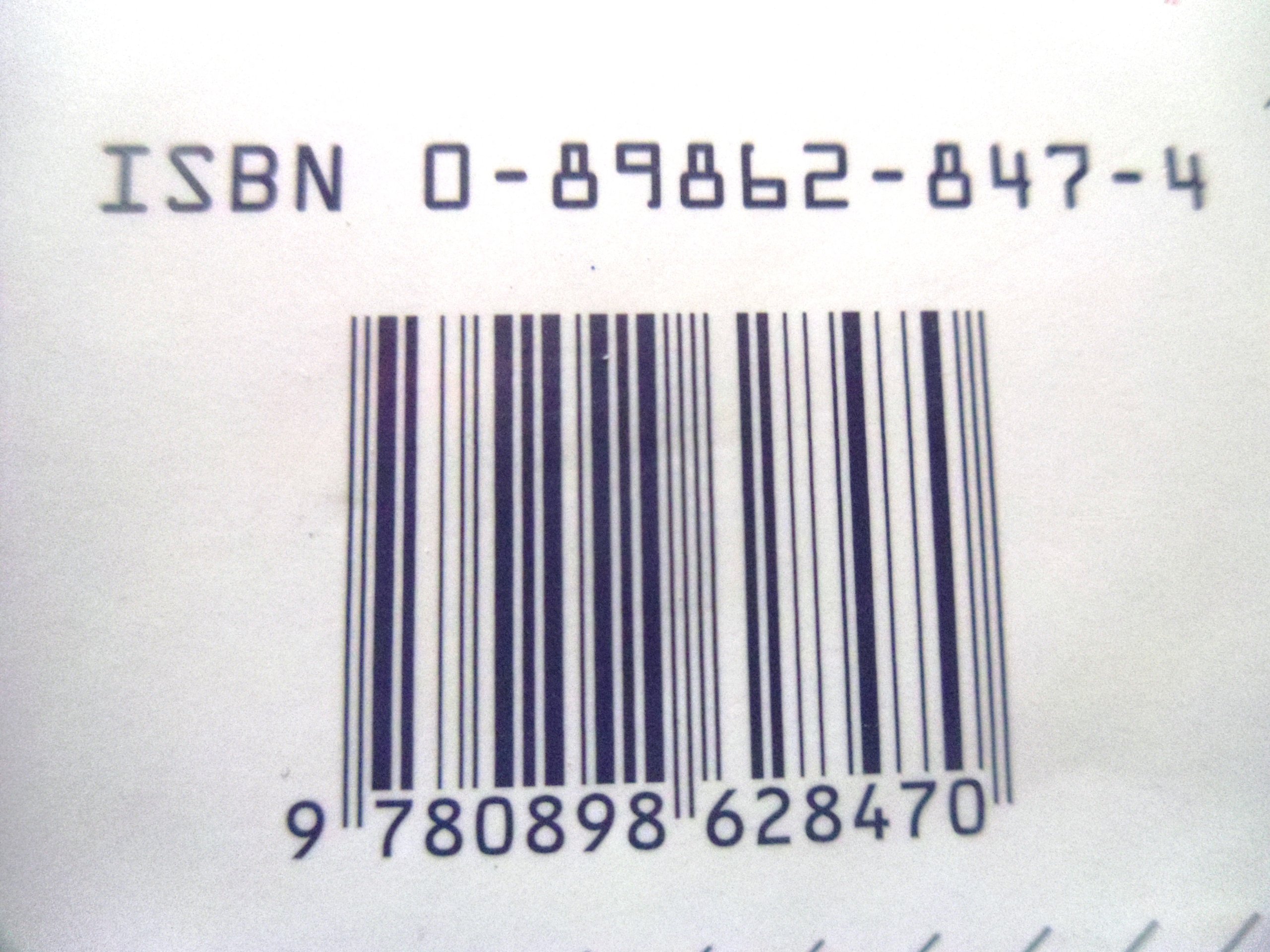





Cognitive Therapy: Basics and Beyond
K**I
Worth Reading
Interestingly, this book was written by the daughter of the founder of Cognitive Psychology. It reads easily from the beginning, and when more complex data is presented, the reader can follow along without struggling over a myriad of unfamilliar terms.I used to say to my friends that everyone needs a little therapy, and this book confirms my theory. It also has confirmed I need more work than most as a woman who's been diagnosed as bi-polar. Since my early 20's, I was mis-diagnosed and given treatments that caused confusing and disruptive side effects. Dealing with a diagnosis of this brevity can obliterate the life you thought was yours.This branch of psychology, Cognitive Therapy, is probably one of the youngest of psych schools and thankfully goes beyond the work of its predecessors, Freud and Jung. (Haven't read much of Maslow's work.) The concepts in this text are so simple: that being, through no fault of one's own, the thoughts we produce create effects in our lives and can be reframed to create desired outcomes.There are many tools to apply in this book, ranging from learning to identify the signs (and types) of cognitive distortions people make, learning how to reframe mental distortions to something positive and compassionate, and lots of written exercises to draw up in a notebook or (if you're in a manic phase) type and print on the computer and fill out later as problems crop up.As I said before the jargon is plain and because the information begins simply, if you're anxious to get started, this book gets you on a new path of thought and behavior right away. It's a fine book and because there's also a running dialoge of sessions between patient and therapist throughout, I'm sure those planning to work in this field would be equally happy with its contents.
K**N
Useful
Therapy resourse
S**K
Good resource book for Cognitive Therapy
Great book. Among the other benefits it provides, it can help the practitioner develop case plans. For example, the therapist can use the flow charts provided to help decide what the client's underlying issue is. Provides information and examples about how to best navigate the client's situation. Very pragmatic book with a lot of good examples and ideas. Worth keeping in your library.PS I am a beginnning therapist, so maybe a more seasoned therapist would not find it as helpful. (?) I sure like it, though!
N**S
Great book to read
This is a book that would or will have you thinking about your cognitive thoughts while rationalizing on how to process what you’re feeling in that moment.
B**L
Great CBT book by the daughter of the founder
Judith Beck does an excellent job teaching the foundations of CBT in this book. Must read for any psychiatry resident or therapist who practices CBT. This is the go-to definitive book on cognitive behavioral therapy and its foundations and techniques. Very well written and easy to read
M**2
Great Reference Book
As someone studying to be a psychologist, this book is a CBT must. This provides a very strict, scripted approach to CBT by one of the CBT fundamentalists. Even if you aren't interested conducting cognitive behavioral therapy, the strategies in this book can be used in many different capacities. I highly recommend this as a reference book for any therapist - lots of great information that is highly adaptable for lots of different therapists and clients.
S**G
The Nuts and Bults
This book teaches the nuts and bolts of Cognitive Therapy. I first read this book as part of a graduate course on cognitive-behavioral therapy and have been using it as a reference book and an occasional refresher ever since. The book covers the most important structural and content components of cognitive therapy. It is didactic in format and interspersed with client/therapist dialogue illustrating various techniques and problem situations as well as the phases of therapy. This book is proof that Judith Beck is both a talented teacher and practitioner of cognitive therapy.
R**M
book Review
This is an excellent book for those who are trained in counseling or therapy that want an overview and general breakdown of CBT. The book is written by daughter of the original designer of CBT and is highly recommended by this reader. I've been reading books on cognitive therapies for the past 5 years and this give an excellent break down.Rodney MulhollemClinical TherapistLife Coach
M**X
Very professional
It’s very well designed to guide one through developing cognitive therapy systems and tools.
N**Y
A bible for students of CBT
This book was on my university reading list when I studied for my post-graduate diploma in CBT. It was an absolute bible for me and my coursemates! In fact it was one of two staple books that I could not have managed without (the other being Wells' Cognitive Therapy of Anxiety Disorders). It was such a relief to see clear, concise guidelines about what to cover in first and early sessions and is written very much in an instructional manner. Particularly when learning a guide of this manner can be a confidence boost. I did not find it a struggle to read - it is just as useful to 'dip into' when needing something from a relevant section.I now recommend it to supervisees I work with and they have said how useful it has been to them.
N**E
Judith Beck's Cognitive Therapy
This is very much intended as a simple and practical, step-by-step introduction to the practice of Judith (and Aaron) Beck's Cognitive Therapy in particular, rather than CBT in general. As one would expect, the manual is highly structured and logically presented. Certainly useful for me as a counsellor in the early stages of training, although I will consider it an expensive purchase if I do not proceed to practice CBT! For a general study of CBT I also consulted Aaron T. Beck's Cognitive Therapy and the Emotional Disorders (1976); and some relevant and practical Sage publications on REBT and Cognitive Behavioural Counselling (Trower, Casey, Dryden 1988 / Dryden & Neenan 2004); as well as Corey's Theory and Practice ...(2005) and Fall, Holden & Marquis's Theoretical Models... (2004)
D**N
Excellent Introductory Guide
I first read Judith Beck's Basics & Beyond shortly after it was first published in 1995, and I returned to read it closely again recently. It's a seminal book and every cognitive therapist should have read it through. It's extremely well-written and comprehensive, talking the therapist through each aspect of treatment, albeit from a generic perspective. It's better as an approach to depression and certain other issues than as a guide to treating anxiety disorders, although Cognitive Therapy of Anxiety Disorders now provides a very comprehensive guide to Beckian cognitive therapy of anxiety. It would be good to see a second revised edition now, although this version is still worth reading and an excellent starting place for anyone interested in cognitive therapy.Donald Robertson, author of, The Philosophy of Cognitive-Behavioural Therapy (CBT): Stoic Philosophy as Rational and Cognitive Psychotherapy The Discovery of Hypnosis: The Complete Writings of James Braid the Father of Hypnotherapy The Practice of Cognitive-Behavioural HypnotherapyCognitive Therapy of Anxiety DisordersThe Philosophy of Cognitive-Behavioural Therapy (CBT): Stoic Philosophy as Rational and Cognitive PsychotherapyThe Discovery of Hypnosis: The Complete Writings of James Braid the Father of HypnotherapyThe Practice of Cognitive-Behavioural Hypnotherapy
A**R
Good description
the book was as described. The main hint that it was preowned was a slip of paper in it with notes which is helpful. It arrived within the time allowed. The only criticism is that the packaging could be better to prevent damage in transit
Trustpilot
2 weeks ago
2 weeks ago